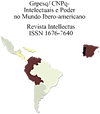Ñzayilu Kyûtilu, African Philosophy’s School
DOI:
https://doi.org/10.12957/intellectus.2024.80670Keywords:
African Philosophy, Kôngo wit, Virtues;, ProverbsAbstract
The present text addresses the themes addressed in the School of Philosophy before 1717 in the ancient kingdom of Kôngo as a response to the need to enrich African Philosophy with the names of thinkers and their reflections. On the other hand, from some initiatory songs and proverbs, it is possible to restore concrete thoughts and establish comparisons between them. In general, the article offers syntheses of different subsidies in relation to what would have been the general panorama of Philosophy in ancient Kôngo and the legacy that, nowadays, is hidden in the oral Tradition.
Downloads
References
BATSÎKAMA, Patrício, (2023). Filosofia da arte no espaço muntu-angolano, Recife: EDUPE
BATSÎKAMA, Raphaël (1971). Voici les Jagas ou l’Historie d’un peuple parricide bien malgrè lui, Kinsâsa: O.N.D.R.
BENTLEY, Holman (1895). Dictionary and Gramar of the Kongo Langauge, Londres: British Missionary Society.
BIDIMA, Jean-Godefroy, (1995). La philosophie négro-africaine, Paris: P.U.F.
BITTRÉMIEUX, Léon (1936). La société secrète des Bakhimba au Mayombe, Bruxelas: I.R.C.B.
BRÁSIO, António, (1952). Monumenta Missionária Africana, I, Lisboa: Agência Geral do Ultramar.
BRÁSIO, António, (1973). História e missiologia. Inéditos e esparsos, Luanda: Instituto de Investigação Científica de Angola.
CAVAZZI, António, (1965). Descrição histórica de três reinos do Congo, Matamba e Angola. I, Lisboa: Junta de Investigações de Ultramar.
CUVELIER, Jean (1934). Nkutama mvila za makanda mu nsi’a Kôngo, Tumba.
CUVELIER, Jean (1953). Relations sur le Congo du Père Laurent de Lucques (1700-1717), Bruxelas: I.R.C.B.
DE CLEEN, N., (1935). «Les chefs indigènes au Mayombe», In: Africa, n.º 8: 63-75
DIAGNE, Souleymane Bachir, (2013). L’encre des savants. Réflexion sur la philosophie en Afrique, Paris: Présence africaine/Codersia.
DIOP, Cheikh Anta, (1977). Parenté génétique de l'égyptien pharaonique et des langues négro-africaines, Dakar: IFAN-NEA.
DOUTRELOUX, Albert (1961). «Magie yombe. Notes sur la fonction sociologique des formes para-religieuses”, In: Zaire – Revue congolaise, n.º 15: 45-57.
FUKYAWU, Kimbwandende (2001). African Cosmogony and the Bântu-Kongo Principles of life and living, Athelia Henrietta Press
GONÇALVES, António, (1985). Le lignage contre l’Etat. Dynamique politique Kôngo du XVIème au XVIIIème siècle, Lisboa/Évora: Instituto de Investigação Científica | Universidade de Évora.
JADIN, Louis (1967). “Pero Tavares, missionaire jésuite ses travaux apololiques au Congo et Angola, 1629-1635”, In: Bulletin, Institut historique belge de Rome, Tome 38:271-402.
LABURTHE-TOLRA, Philoppe; BUREAU, René (1971). Initiation africaine. Supllément de philosophie et de sociologie à l’usage de l’Afrique noire, Yaoundé: éditions CLE.
LAMAN, Karl (1936). Dictionaire Kikongo-français, Bruxelas: Institut Royale Colonial Belge.
MATONDA, Igor (2020). «L’identité des Pamzoallumbu ou Pangelungus du royaume Kongo. Essai d’interprétation du sens et du contexte d’un terme au XVIe siècle: In: CahiersCahiers d’études Africaines, vol. LX (2), n.º 238:371-406.
MERTENS, J. (1942). Les chefs couronnés chez les Bakonto orientaux. Étude du regime successoral, Bruxelas: Institut Royal Colonial Belge.
NGOENHA, Severino, (1993). Filosofia africana das independências às liberdades, Maputu: Edições paulistas-África.
OKIN Zung (1977). «De la prosodie linguistique à l’originalité de la philosophie africaine, une phénomenologie de la question», In: La sémiologie et la littérature africaiine, Lubumbashi: CELA:153-164.
SANTOS, Martins dos (1970). História do Ensino em Angola, Luanda: Edição dos Serviços de Educação.
STENSTRÖM, Oscar (1999). Proverbes des Bakongo, Uppsala/Kimpese: The Swedish Institute of Missionary Research.
THORNTON, John, (2020). A History of West Central of Africa to 1850, Cambridge: Cambridge University Press.
TROESCH, J (1962). «Le Royaume de Soyo», In: Aequaroria, n.º 25, (3): 95-100.
TSHIAMALENGA Ntumba, (1982). «L’art comme langage et comme vérité?, In: Art religieux africain – Cahiers des religions africaines, 16, n.º31-32:65-70.
VAN WING, Joseph (1921). «Nzo longo ou les rites de la puberté chez les Bakongo», In: Congo – Révue general de la Colonie belge, Tomo I, n.º 3, Março 1921.
VAN WING, Joseph, (1938). Études Bakongo. Magie et Religion, Bruxelas: M.I.R.C.B.
VAN WING, Joseph; PENDER, J (1928). Le plus ancien dictionaire Bantu, Lovaina: Kuyl-Otto.
VERLY, Robert (1955). “Les mintadi: la statuaire de Pierre du Bas-Congo (Bamboma-Mussurungo)”, In: Revue Zaïre, Vol. 9, n.º 5:451-528.
WEEKS, John, (1914). Among The Primitive Bakongo, Londres: Seeley Service.
ZAU, Filipe (2013). Educação em Angola. Novos trilhos para o desenvolvimento, Lisboa: Movilivros.
ZUCCHELLI, António, (1712). Relazioni del viaggio e missioni del Congo, Venezia.
Downloads
Published
How to Cite
Issue
Section
License
Copyright (c) 2024 Patrício Batsikama

This work is licensed under a Creative Commons Attribution-NonCommercial-ShareAlike 4.0 International License.
Autores que publicam nesta revista concordam com os seguintes termos:
Os autores mantêm os direitos autorais e concedem à revista Intellèctus o direito de publicação, sob uma Licença Creative Commons Atribuição 4.0 Internacional, a qual permite que outros distribuam, remixem, adaptem e criem a partir do seu trabalho, mesmo para fins comerciais, desde que lhe atribuam o devido crédito pela criação original.
Os dados e conceitos abordados são da exclusiva responsabilidade do autor.
A revista Intellèctus está licenciada com uma licença Creative Commons Atribuição 4.0 Internacional





